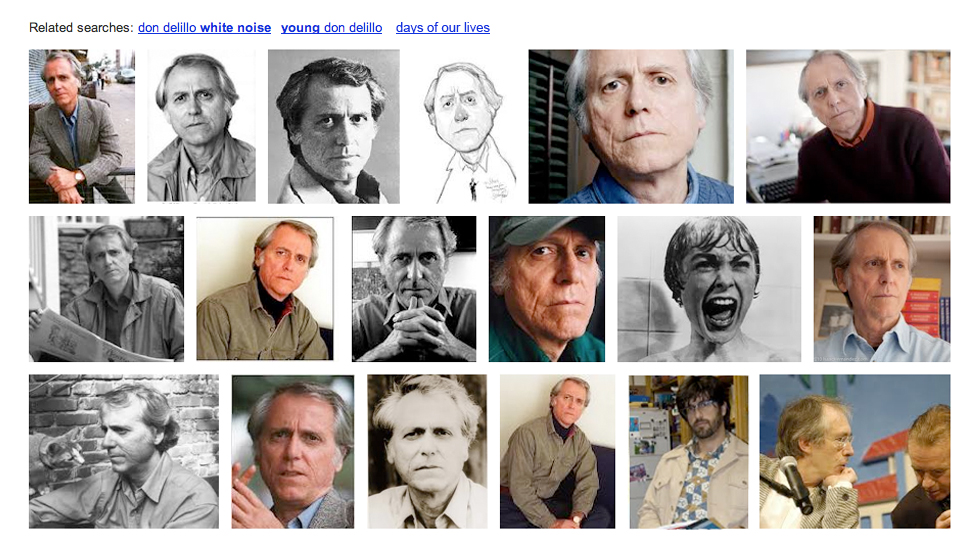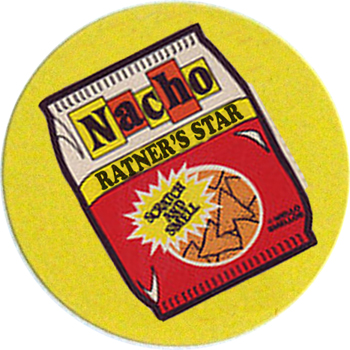obsession
by John Lardas Modern

I am a sick man. I am a jealous man. Endowed with a certain Mediterranean vigor I am spiteful, sickened to death by Tom Brokaw’s shit-eating grin, disgusted with my family and former friends, fearful of aloof dot-commers in a Biblical way, their SUV’s, their palm pilots, their material stink swarming around me. But I will be honest with you. I harbor such strange opinions because I have fallen into the literary life. A noble calling, you might say. But I did not choose this hell, this torture that even the most vile of Chinese sadists couldn’t stomach. I have yet to find my own voice. I have yet to be original in any sense of the term. I am a garden-variety critic, a poetaster with no skill, only taste. I am a scab, aware at all times, night and day, that I am derivative, the new and improved version of what already came before. I want to be an artist, a sayer of truth. But I am blocked. Hindered and haunted by the words of another. To make a long story short, I am obsessed with Don DeLillo.
A confession, gentle reader, of what lies behind.
I have been in contact with others who share my obsession, chat room buddies, friends of friends who pick up used copies of White Noise to give away at parties, and last but not least, The Don DeLillo Society, an academic clique of which I was once a proud member. Founded in 1999, we organize and sponsor panels on DeLillo at various literary conferences. We are the gauntlet of DeLillo criticism. If you want to say something about DeLillo you must first go through us. We are in the know. Nothing that DeLillo writes, says, or does eludes our grasp. We understand how DeLillo relates to contemporary issues of race, gender, and class. We have come to realize the subtle workings of his mind and how they relate to our own.
I was recently forced to resign from the DeLillo Society after a colleague suggested that we write a book together about DeLillo’s depictions of media violence. I had thought of this already! So I punched him in the nose. I was soon fired from my University post and he is suing me. I am suing the University for wrongful termination. The Chronicle of Higher Education has gotten involved (too involved if you ask me!), milking the story for its salacious metacommentary.
I am now unemployed, a stay-at-home dad with no prospect of gainful employment. But in order to maintain appearances, I will let you in on my imaginary—where I am coming from and what I take for granted when I speak of things DeLillo. I have never been to prison. I was born in Akron, Ohio but tell people I’m from Cleveland. I love cats. When I was twenty-two I applied to law school but was rejected by every goddamn one, a sign, I believe, of things to come. I am quick to anger. A victim, plain and simple.
My life can be summarized by my cultural obsessions beginning with my mother’s soap operas in the summers between second and third grades—Days of Our Lives and Another World— intrigue, murder, and sex whose narrative was jointed and deferred. I quickly moved onto KISS—KISS tapes, KISS jacket, KISS dolls, KISS cards and the prized #18, a solitary Ace Frehley on guitar, a sparkling, spacey vision of silver and white. Only my friend Brett Beadow had been blessed with #18, at that time a point of contention and awkward jealousy. I then spent five years thinking about nothing but baseball cards, arranging and rearranging them in plastic pockets, stealing packs from the drug store, memorizing statistics and perfect mint prices, going to card shows and collecting every Pete Rose card there was, every year, all mint, all Charlie Hustle, from the 1963 rookie card to the 1984 Fleer update. After the cardboard heroes lost their luster, I moved onto more sophisticated fare. Before DeLillo there was Galaga, Prince, Led Zeppelin, and Bon Jovi, Civil War battle reenactments, Laurie Anderson, semiotics, and Moby-Dick to name only a few.
I fell into the words of Don DeLillo on November 16, 1997 (now a family holiday). That was the day I first began reading Underworld. It took eight days of slow, methodical turns, one page at a time, copious notes, tears, and illumination. I would read sections over and over again. I would spend hours on a single paragraph. The first line a coded message, a direct challenge to the reader, hanging there, waiting for me to decipher it.
He speaks in your voice, American, and there’s a shine in his eye that’s halfway hopeful.
Since then I have read everything by DeLillo at least three times, collected all the first editions, written fan letters to DeLillo on a weekly basis (Don DeLillo, c/o Scribner, 1230 Avenue of the Americas, New York, NY, 10020), lurked around chat rooms dedicated to his work under a myriad of user names, sometimes picking fights with myself in order to assure victory. I have a bumper sticker on my car that reads “If You Love Don DeLillo You’re Too Close.” I have used Americana (DeLillo’s first novel) as a bedtime story for my sons. I hope to pass on something special to them through DeLillo’s linguistic code. My orange tabby, Barbara, is named after DeLillo’s wife.
It seems as though I was born to be a critic, zeroing in on different chinks in the cultural armor, deconstructing them, looking for an opening, always searching for a way out. I am a tragic and pathetic figure, an angry young man who resents giving you, dear reader, the literary facts of the day:
Born on November 20, 1936, Don DeLillo was raised in the Bronx, attended Catholic high school and later Fordham University. Like Salman Rushdie, he worked as a copywriter for Ogilvy and Mather before moving onto fiction. Unlike Rushdie, however, DeLillo has never been the target of an Islamic fatwa. He has never been buddy-buddy with Bono or undergone cosmetic surgery. DeLillo usually passes on such pomp and circumstance for a reason. Great writers and their work, he says, are “too ready to be neutralized, to be incorporated into the ambient noise. This is why we need the writer in opposition, the novelist who writes against power, who writes against the corporation or the state or the whole apparatus of assimilation. We’re all one beat away from becoming elevator music.” In keeping with his professed outsider status, DeLillo rarely grants interviews. He does not appear on Charlie Rose. He doesn’t write book reviews or participate in writing workshops or the academic life.
Last summer my DeLillo mania grew progressively worse. I experienced unexplained blackouts, alternating episodes of depression and euphoria. In July I made a DeLillo kachina doll out of old New York Times and scraps of cloth, perfectly proportioned to his thin, 145 pound frame. I began to experiment with DeLillo scratch-n-sniffs, a different smell for each of his books. In August I set up a small lab in my basement, complete with beakers and Bunsen burners. I have yet to complete my chemistry project but I imagine a gamut of literary aromas, each sticker in its own way a summation of plot, characters, and denouement. Here is what Ratner’s Star smells like. Go ahead. Scratch your screen:

I know this smell.
You know this smell.
Because we have slipped into the stream of DeLillo’s sensorium—the writer who once described himself as a literary terrorist; the writer who does not ruminate over subtle emotional shifts or the minor grievances of domestic life; the writer who does not deal “painfully and honestly” with the latest political crisis.
But as DeLillo prophecies, the culture that contains us eludes our desire to mark it, to use its content to remind us of our formal freedom. We are ever haunted by visions of a more complete self, an identity fully realized—a kinder, gentler, more articulate version—someone who volunteers, who makes a difference, who sinks the three-pointer at the buzzer, who publishes brilliant tomes, who captures the zeitgeist, who is loved unconditionally and bravely chooses a fate. This is the “naked shitmost self” that we believe, desperately, tragically, is there, somewhere. “Even when you self-destruct,” cautions a DeLillo character, “you want to fail more, lose more, die more than others, stink more than others.”
I know exactly what he is talking about. Because I am a humble apprentice. Because I have absorbed and digested Don DeLillo. Because I am the fungus that lurks between his toes.
This is my demonic side, the part that goes without saying, the part that is controlled from without, the part that we, dear reader, don’t like to admit to ourselves because we can’t. Like Livia Majeski from Valparaiso, “We feel things. We become addicted to things because life, itself, is habit forming. We start things and can’t stop.”
We seek comfort in the never-ending stream of gadgets and digital doo-dads—all those products endowed with a life-force independent of the human touch. The NASDAQ soars or plummets, money talks, your new iMac works for you. All the while the individual is reduced to an inanimate object at the mercy of market forces. On your knees, beckons the radio man, bow down and breathe in that new car smell, the smell that soothes the wounds of childhood. This is what it’s all about, the otherworldly scent of densely pressed aluminum and vinylized leather that brings you closer to God.
This is the spiritual spiral that has led to my scratch-n-sniff experiments, breaking the world up into signifieds and signifiers, the way things smell and how I talk about these ways and these smells.
But I am ready to be healed, to begin to refuse analogy, to deny that everything is connected to everything else. To move across, away, and beyond DeLillo.
This condition, of course, was depicted brilliantly by DeLillo in chapter 39 of White Noise when the narrator Jack Gladney becomes aware of his own cynicism and confronts Willie Mink, the mysterious inventor of Dylar, an anti-death-anxiety drug to which Mink has become addicted. The main side effect of Dylar is linguistic decadence in extremis. When Jack says “Falling plane,” Mink panics and grabs the arms of his chair. When Jack whispers “Hail of Bullets,” Mink dives to the floor and begins “crawling toward the bathroom, looking back over his shoulder, childlike, miming, using principles of design but showing real terror.”
I want to someday say these words and know, in a visceral way, that they are not my own. I want to be redeemed, bathed in the blood of Latin letters. I want to jettison quaint, well-behaved narratives with neat plots and worked-out endings, to feel the incoherency of modern life on a deeper level, to write as a form of religious meditation in which language is the flawed and final recourse to enlightenment.
A version of this entry was originally published in SPEAK 20 (Fall 2000): 12-17.